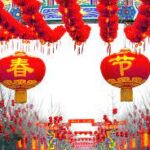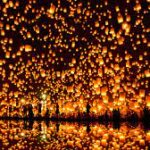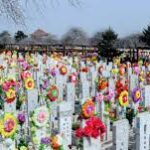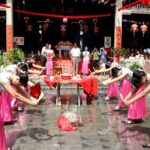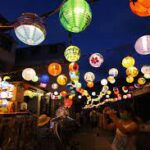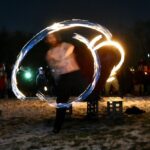中国传统节日由来
New Year (—元旦) It falls on the first day of the year. It marks the beginning of a year. People will plan what to do in the new year. Because they believe that the whole year’s work depends on a good start in spring.
The Spring Festival (春节) Spring Festival is the most important festival in China. It is on the first day of the first lunar month(阴历正月). On the eve of the festival, people will paste spring poems(贴春联)with lucky words. They prepare delicious food, dumpling is a must. They also clean their house, but there is no sweeping on spring festival for people think it will sweep away good luck. People often come back home to enjoy family reunion, the whole family will get together for the big dinner. They also exchange greeting with other friends and relatives.
Lantern Festival (元宵节) It comes on the 15th of the first lunar month and it marks the end of the Spring Festival. On this day, people often eat sweet dumplings(元宵)for good luck. They will visit the display of lanterns(灯展)or go for temple fair(庙会)
Qingming Festival (清明节) Qingming —It is also called Tomb-Sweeping Day. It falls on April 4th or 5th . That is a special day for the living to show love and respect to their dead friends or relatives. People often go to sweep the tomb and put the meat, wine in front of the tomb. One interesting thing is that people burn the paper money for the dead.
Dragon Boat Festival (端午节) This day is on the fifth of the fifth lunar month, People often get together to watch the wonderful “Dragon Boat Race”(龙舟大赛),Rice dumpling is a must on Dragon Boat Festival.
Double Seventh Festival (七夕) The Qixi Festival (Chinese: 七夕), also known as the Qiqiao Festival (Chinese: 乞巧), is a Chinese festival celebrating the annual meeting of the cowherd and weaver girl in mythology. The festival is celebrated on the seventh day of the seventh lunisolar month on the Chinese calendar.
Mid-Autumn Festival (中秋节) It comes on the 15th of the eighth lunar month. People often gaze at the “Lady in the moon”(嫦娥) and eat moon cakes.
Double Ninth Festival (重阳节) According to the I Ching, nine is a yang number; the ninth day of the ninth lunar month (or double nine) has too much yang (a traditional Chinese spiritual concept) and is thus a potentially very auspicious date. Hence, the day is also called “Double Yang Festival” (重陽 節). It is customary to climb a high mountain, drink chrysanthemum liquor, and wear the zhuyu (茱萸) plant, Cornus officinalis. (Both chrysanthemum and zhuyu are considered to have cleansing qualities and are used on other occasions to air out houses and cure illnesses
Winter Solstice Festival (东芝) The origins of this festival can be traced back to the yin and yang philosophy of balance and harmony in the cosmos. After this celebration, there will be days with longer daylight hours and therefore an increase in positive energy flowing in.
- New Year
- The Spring Festival
- Lantern Festival
- Qingming Festival
- Dragon boat festival
- Double seventh festival
- Mid-autumn festival
- Double ninth festival
- Winter solstice festival

